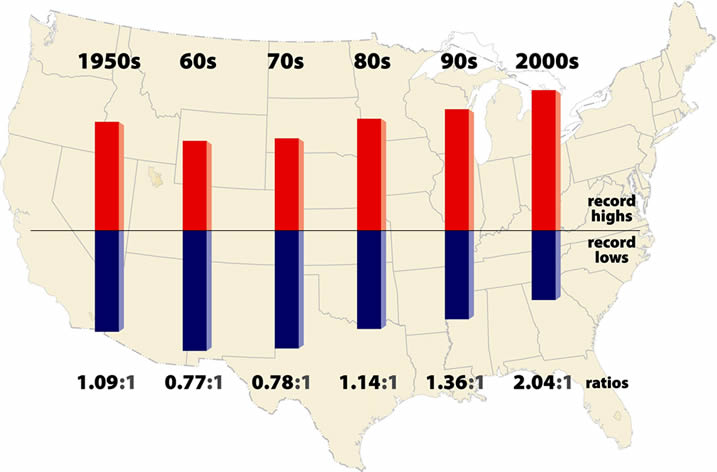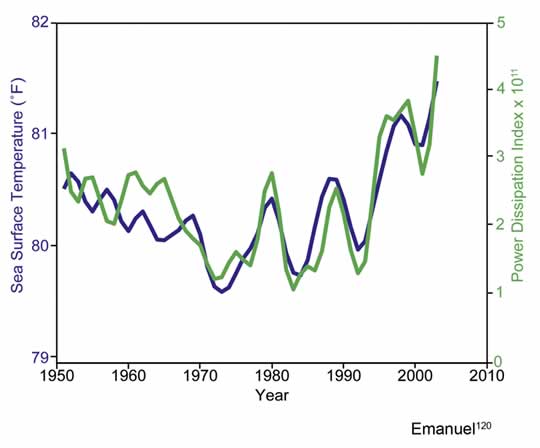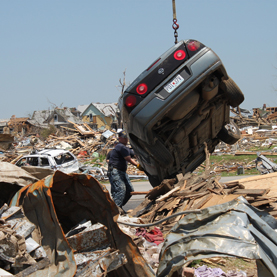“Global weirding” is a term popularized by Thomas Friedman in a 2007 New York Times article about the final report of the U.N.’s Intergovernmental Panel on Climate Change: “I prefer the term ‘global weirding,’ coined by Hunter Lovins, co-founder of the Rocky Mountain Institute, because the rise in average global temperature is going to lead to all sorts of crazy things — from hotter heat spells and droughts in some places, to colder cold spells and more violent storms, more intense flooding, forest fires, and species loss in other places.” And, indeed, such “crazy things” have continued to escalate in the past 4 years, as exemplified by the summer of 2011 in the U.S.
This summer’s heat waves, floods, droughts, and other weather-related extremes are largely the result of global warming (or whatever you want to call it), according to the “Current Extreme Weather and Climate Change” report, released today by the Climate Communication scientific group: “Recent weather events such as deadly heat waves and devastating floods have sparked popular interest in understanding the role of global warming in driving extreme weather. These events are part of a new pattern of more extreme weather across the globe, shaped in part by human-induced climate change. As the climate has warmed, some types of extreme weather have become more frequent and severe in recent decades, with increases in extreme heat, intense precipitation, and drought. Heat waves are longer and hotter. Heavy rains and flooding are more frequent. In a wide swing between extremes, drought, too, is more intense and more widespread.”
There were 10 billion-dollar natural disasters this year, a record for the U.S. While the report notes that there is disagreement about the role of global warming in some severe weather events, such as hurricanes, or the frequency of El Nino weather patterns, it maintains that higher temperatures are a major contributor to climatic extremes. “Rather than totally triggering any extreme event, global warming just makes it worse, says meteorologist Jeff Masters of Weather Underground, a report reviewer. ‘A warmer atmosphere has more energy,’ he says, contributing to heat waves, tornadoes and other extremes. Even heavy blizzards come from an atmosphere packed with extra moisture by global warming he adds. ‘Years like 2011 may be the new normal.’ ‘Greenhouse gases are the steroids of weather,’ said climate projection expert Jerry Meehl of the National Center for Atmospheric Research, at a briefing held by the report’s expert reviewers. ‘Small increases in temperature set the stage for record breaking extreme temperature events.’ Overall, says the report, higher temperatures tied to global warming, about a one-degree global average temperature rise in the last century, have widely contributed to recent runs of horrible weather” (source).
“Another outside climate scientist, Gavin Schmidt of Columbia University, said by email that public discussions of the role of climate change in extreme weather events, ‘oscillate between two equally unlikely extremes – that all weather events are caused by global warming or that global warming has no effect on weather at all.’ Too often, the discussion finally descends to name-calling (‘alarmist’ or ‘denier’) between disagreeing sides. He goes on to state: ‘The facts of the matter are this: the planet’s climate has changed over the last 30 years, chiefly because of human activities. This will impact the weather – in the trivial sense that the specific weather we are having is not the same as the weather that we would have had without human actions, but also in the non-trivial sense that probabilities of various outcomes will shift – sometimes towards more extremes and sometimes towards less. We have a great deal of difficulty characterizing these changes because of insufficient observations (not enough 100 year periods to properly estimate 100 year events), insufficient attention to extremes in modeling and theory, inaccessibility of model results for extremes, and the basic statistical difficulty in attributing infrequent occurrences.’
‘Nonetheless, the data are good enough to say some things about certain kinds of extremes (heat waves, rainfall intensity (both going up), cold snaps (going down) etc.). In far more cases however, the studies simply have not been done, or the data are simply not good enough to say much, and pundits are tending to extrapolate. That is something most scientists are loath to do. For researchers, he adds, tracing the role of global warming in extreme weather presents an intriguing problem. However, the portrayal of this nuanced field in public as either proving that global warming is bad, or that scientists are alarmists, is a travesty. The impact on extremes from human emissions is one of a myriad reasons why we probably don’t want to continue to mess with the planetary energy balance’” (Ibid.).






